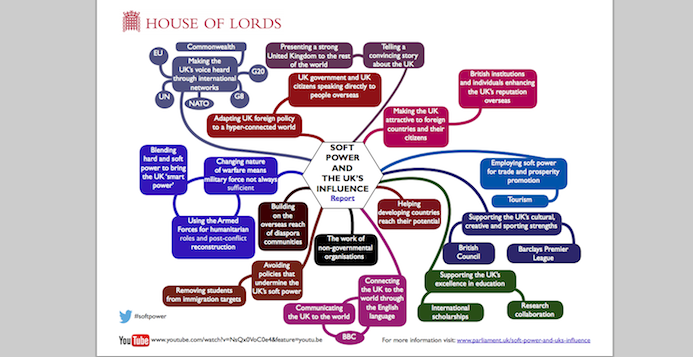Could British English become a new export strategy for the UK? A Lords committee is calling for a central government unit to be set up to ensure soft power is central to government policy. It has undertaken an in-depth analysis of soft power and the report calls for students to be omitted from the net migration count and for the British Council and overseas embassies to be more engaged in promoting British English and culture.
News and business analysis for Professionals in International Education
Have some pie!
Lords call for government unit to pursue UK soft power
 A mind map charting what soft power is was produced along with the report
A mind map charting what soft power is was produced along with the report Explaining soft power as “the ability to influence by persuasion not force”, the report says the UK is in danger of neglecting its soft power assets. It wants to better leverage cultural assets such as the BBC World Service, British Council, its creative industries as well as its Commonwealth connections.
“Our evidence suggested that the new significance for the UK of the modern Commonwealth, offering high-growth and high-savings markets, as well as a gateway to many of the great emerging powers of Asia, Africa and Latin America, is not quite understood in Whitehall,” stated the report.
Lord Howell of Guildford was Chairman of the committee. In a video interview, he acknowledged that with “the globalisation of information complete”, there has been a shift in power away from America and the West.
“We say that the government should first of all stop doing things that undermine [its range of soft power] assets and secondly it should use them much more effectively,” he explained, noting that a “minus” was the way the government had handled the visa issue.
“the Commonwealth network is two billion people – many of them in expanding big economies”
Giving examples of how to better use the UK’s existing assets, Howell nodded to “strengthening our embassies around the world; talking up the Commonwealth network of two billion people – many of them expanding big economies – and encouraging our enormous creativity and cultural influence around the world”.
“All these things require a different approach by government from the one we see at present,” stated Howell, explaining how a new strategic unit in government would be an interface between various departments, aligning objectives across education, training, defence and export portfolios for example.
The evidence sessions that are still available online illustrate the significant research and input that the Lords committee gathered into this inquiry, which began in May last year. Those giving evidence included big names from government, cultural organs such as the British Council and British Museum, the press, export councils and many ambassadors.
The committee suggested the British Council be “properly resourced” but also provide more insight as to how it supports private sector educators, so as not to disadvantage private companies offering “British English education” (recommendation no. 53).
John Worne, Director of Strategy at the British Council, said, “This report makes clear that the UK has deeply attractive soft power assets – not least those the British Council shares with the world: the English language, our education system, UK arts and our open vibrant culture.”
Among the 88 recommendations, others were to expand scholarship schemes and study abroad incentives; to improve visa access for tourists in key markets and keep an eye on competitor countries’ policies; seek new funding models to protect the BBC World Service output; build embassy resources and remove foreign students from the net migration count.
“We welcome the government’s ambition to reopen diplomatic posts across the world, particularly in the BRIC countries and Latin America”
On this, the report states, “We note that we are the sixth Select Committee to recommend in this Parliament that the government remove international students from the net migration target, and that the Chairs of the other five Commons and Lords Committees to do so wrote to the Prime Minister in January 2013 to stress their belief that this degree of consensus between committees of both Houses was unprecedented.”
Speaking with The PIE News, Lord Howell said the committee expects a response on the report’s recommendations by the end of next month.
“In our report we urged the Government to make a number of important strategic and administrative changes – both to safeguard and to promote Britain’s interests and influence in a fast changing world,” he said.
“We hope that the Government will take on board our recommendations, and we look forward to a substantive response from them before the end of May.”
To read more about this report and another UK-focused report on soft power, click here.
Still looking? Find by category:



2 Responses to Lords call for government unit to pursue UK soft power